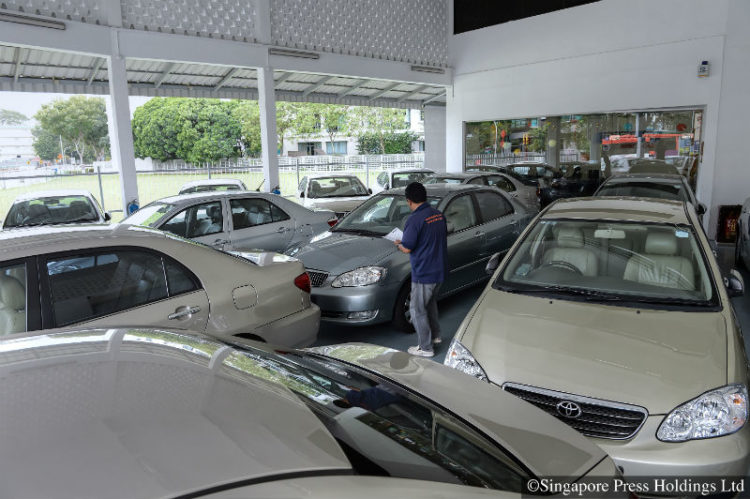
An employee from a rental car company checking the condition of a car among a fleet of cars at its premises on 4 February 2013.
Cases of car buyers taking up larger loans through private-hire car purchase agreements as a way around the Government’s loan restrictions will be investigated.
Acting Minister for Education (Higher Education and Skills) Ong Ye Kung, who sits on the board of directors at the Monetary Authority of Singapore (MAS), served this notice in Parliament yesterday when responding to Mr Pritam Singh (Aljunied GRC).
The Workers’ Party MP had raised concerns that private-hire car purchase agreements created a “loophole” or “work-around” to existing vehicle loan curbs.
However, some buyers are taking loans of up to 90 percent of the car price, and paying it back over 10 years.
They do so through private-hire car purchase agreements in which they buy and register the car under a company, to be used for chauffeuring under ride-hailing apps such as Uber and Grab.
The MAS has previously said loans taken to purchase private- hire cars do not fall under its car loan restrictions.
But Mr Singh said some people could take advantage of the system.
“There is also the prospect of not running it for that purpose at all, as when you register a company for private hire under the Uber or Grab framework but, in actual fact, what you’re doing is you’re owning a vehicle,” he said.
Mr Ong replied that both the MAS and the Ministry of Trade and Industry (MTI) will look into such cases, which would be “in violation of the spirit of the policy”.
“I don’t think it’s correct for this to proceed,” he said.
Auto dealers that sell cars to buyers on their own instalment payment programmes have to follow the Hire Purchase Act, which is administered by the MTI.
The MTI also applies the MAS car loan restrictions to non-MAS-regulated entities.
Mr Ong added that private-hire vehicles, such as those used for driving for Uber, are revenue-generating and thus fall under loan considerations for funding a business.
He also said the MAS has not had to take action against any financial institutions since the car loan restrictions were re-introduced three years ago.
Back then, car buyers could get a loan of only up to 60 percent of the purchase price, with a loan tenure of five years, but this requirement was eased in May.
Mr Ong said the MAS monitors financial institutions, including conducting on-site inspections.
“Where a financial institution is found in breach of any of our regulations, MAS will not hesitate to take regulatory action,” he added.











